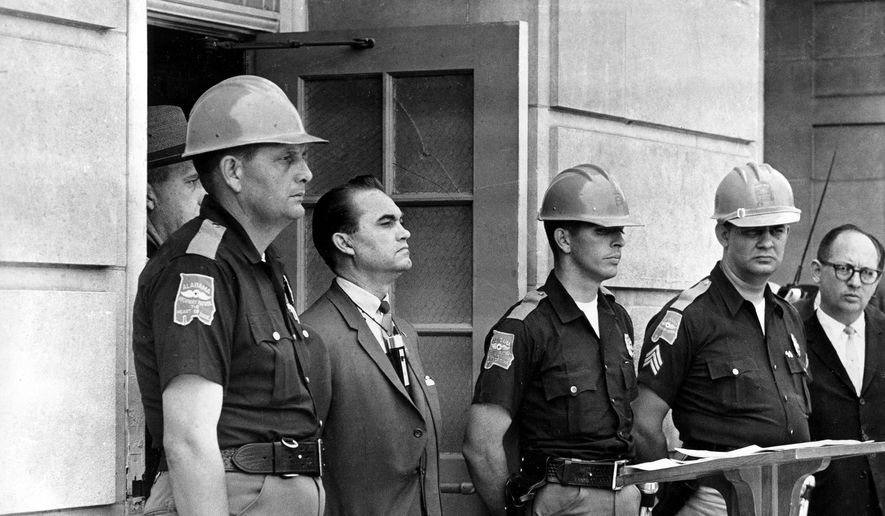A conservative think tank that promotes educational excellence has found that students in all 50 states are expected to learn about slavery, Jim Crow laws and the civil rights movement, despite claims that public schools gloss over those matters.
The Thomas B. Fordham Institute released its 400-page study of civics and U.S. history standards after the nation’s two largest teachers unions endorsed critical race theory as part of curricula and accused detractors of trying to hide harm to Blacks and immigrants.
“On the hot-button issues it turned out fairly balanced,” said Fordham Institute President Emeritus Chester Finn. “Our problems were where we found skimpy standards, or the expectations were too low or they were missing context.”
The study rated Alabama and Tennessee, former Confederate states, as “exemplary.” Maine, Vermont and New Hampshire in the Northeast received F’s.
“It’s not really what you would expect. Our findings do not divide by politics,” Mr. Finn said. “We found states you might not expect that had very good standards and some that had, frankly, crappy standards.”
The study is the first in which the Fordham Institute looks at civics, a hot topic in education circles, and the fourth with U.S. history standards. The last was released in 2011.
Parents in several states have objected to moves by school administrators and teachers to inject critical race theory, which holds that racism is embedded in the nation’s laws and societal norms.
The issue has dominated local school board races and prompted some state legislatures to ban the teaching of critical race theory in K-12 public and charter schools.
In the past two weeks, the nation’s two major teachers unions, the National Education Association and the American Federation of Teachers, announced plans to put millions of dollars and political muscle into support of critical race theory lessons.
Released last week, the Fordham study avoids language and definitions that have dominated the K-12 education debate this year. It makes no mention of “critical race theory” or the umbrella term “anti-racist.”
Instead, the report tries to stake out neutral ground between what it identifies as two poles: the work of The New York Times to make slavery the centerpiece of American history in The 1619 Project and the report by the Trump administration’s 1776 Commission.
The 1619 Project received a Pulitzer Prize even though prominent historians found myriad inaccuracies. The Biden administration scrubbed the 1776 Commission report as soon as it took office in January.
The schism has contributed to an overall demise of interest in history and civics, the Fordham report’s authors said.
“Another — and fast-growing — part of the explanation is more fundamental and worrisome: basic disagreement about how to tell the American story and determine what’s most important for young people to learn,” the report said.
Rather than adopt a polar position of the sort pushed by The New York Times or the Trump administration, the report urges states to take a more measured approach. The authors suggested a deeper, two-year commitment to U.S. history and more precise civics standards.
Their solution is at odds with a Biden administration proposal to have the Department of Education favor initiatives using critical race theory and The 1619 Project when it awards grants for history and civics education.
The administration called for more “action civics,” which supporters say instructs students in real-life political processes. Critics say the approach too often devolves into recruitment of children in partisan policy disagreements.
The report suggests participatory projects for high school civics students, but Mr. Finn said educators should take great care to represent a wide spectrum of policies.
He noted that teachers years ago were quick to recruit students into campaigns against nuclear weapons and said environmental projects could prove problematic today.
“Certainly we don’t want schools churning out lots of ‘Little Gretas,’ because that’s not civics, that’s propaganda,” said Mr. Finn, referring to Greta Thunberg, the Swedish teenage environmental activist.
“But I believe students should engage, should learn how things really work,” he said. “Good civics education would promote an inclination in students that you should do things, that that’s what good people do, it’s just that the ‘action civics’ can get carried away.”
Mr. Finn said a key measurement in approaching history and civics is in the nation’s founding motto: “E Pluribus Unum,” Latin for “out of many, one.”
“There is a central balancing act at work here, one we work at endlessly and will forever,” he said. “You don’t want to get carried away to extremes where you have all ‘e pluribus’ or all ‘unum.’”
Overall, Mr. Finn expressed cautious optimism. He noted that public schools in most Southern states teach that slavery was a driving cause of the Civil War and only 10 states received F’s in both civics and U.S. history standards. The study gave 20 states “inadequate” grades for their combined standards. F for history was the primary downward driver of grades.
• James Varney can be reached at jvarney@washingtontimes.com.




Please read our comment policy before commenting.